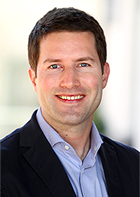 Fellow ⋅ Associate Professor
Fellow ⋅ Associate Professor
[email protected]
Monterey, CA
831.647.6509
Activities
Philipp Bleek is a Fellow at CNS and an Associate Professor in the Nonproliferation and Terrorism Studies Program at the Graduate School of International Policy and Management.
Areas of Research
Causes, consequences, and amelioration of nuclear, biological, and chemical weapons proliferation.
Background
Dr. Bleek has held his current positions at the Middlebury Institute of International Studies (MIIS) at Monterey since 2011. He teaches courses on nuclear, biological, and chemical weapons nonproliferation, non-state use of these technologies, the Middle East, and memo writing and briefing skills. His research addresses a broad swath of these issues. He is active at the intersection between academia and policy making, including serving as a consultant to agencies of the US government and participating in Track 1.5 and 2 dialogues.
During the 2012-13 academic year, Dr. Bleek was on leave from his positions at MIIS to serve as senior advisor to the assistant secretary of defense for nuclear, chemical, and biological defense programs under a Council on Foreign Relations International Affairs Fellowship in Nuclear Security. His primary responsibilities were staffing the Pentagon-based, interagency Syria Chemical Weapons Senior Integration Group, representing the United States in a White House-led dialogue with the Russian Federation focused on Syrian chemical weapons, working on a program to bolster weapons of mass destruction-related situational awareness and warning, supporting the drafting of a new National Defense Strategy for Countering Weapons of Mass Destruction, and participating in chemical and biological terrorism red and blue-team exercises.
Dr. Bleek came to MIIS from Harvard University’s Belfer Center for Science and International Affairs, where he was a pre- and postdoctoral fellow. His PhD studies in international relations, with a focus on nuclear weapon proliferation dynamics, were conducted at Georgetown University. During his PhD studies, he also served as visiting fellow at the Center for Strategic and International Studies and non-resident fellow at the Center for a New American Security. He taught at Georgetown University and in the Department of Defense Senior Leader Development Program, intended to foster the next generation of the department’s civilian leaders. He also served on then-Senator Obama’s nonproliferation policy team during the 2008 campaign.
Dr. Bleek received his master in public policy from Harvard’s John F. Kennedy School of Government, where he focused on both international trade and nuclear proliferation issues. Previously he served as a research analyst at the Arms Control Association and prior to that as Herbert Scoville Jr. Peace Fellow at the Federation of American Scientists and the Arms Control Association. His undergraduate studies at Princeton University’s Woodrow Wilson School of Public and International Affairs focused on environmental economics.
Dr. Bleek is a former term member of the Council on Foreign Relations and a fellow of the Truman National Security Project.
Education
- Ph.D. in international relations from Georgetown University’s Department of Government
- M.A. in public policy from Harvard University’s Kennedy School of Government
- B.A. from Princeton University’s Woodrow Wilson School of Public and International Affairs
CNS Work
- Draconian sanctions ‘on the table’ if Russia violated red line
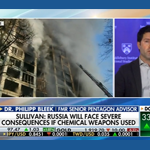 CNS expert Philipp Bleek discusses the possibility of Russia using chemical weapons.
CNS expert Philipp Bleek discusses the possibility of Russia using chemical weapons. - Masters Students in Dual Degree Program Defend Theses
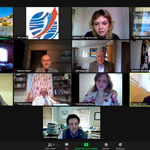 Students from Russia, the United States and South Korea presented their final papers as the result of their studies in 2019-2021.
Students from Russia, the United States and South Korea presented their final papers as the result of their studies in 2019-2021. - Drones and CBRN Terrorism Threats and Responses
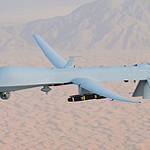 Countering possible “drone-pocalypse” scenarios
Countering possible “drone-pocalypse” scenarios - Track 2 US-Turkey Strategic Dialogue in Brussels
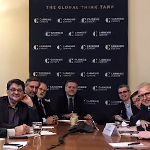 Participants grappled with both challenges and opportunities in U.S.-Turkey relations.
Participants grappled with both challenges and opportunities in U.S.-Turkey relations. - Answering Threats with Threats
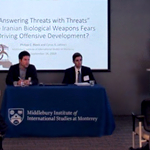 Iranian fears of biological weapons may be driving their offensive development.
Iranian fears of biological weapons may be driving their offensive development. - Reflecting on the Past, Present, and Future of Nuclear Weapons in International Politics
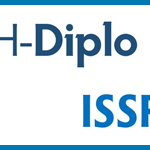 Accessible, policy-relevant scholarship can help inform both public and policymaker conversations.
Accessible, policy-relevant scholarship can help inform both public and policymaker conversations. - Microfluidics Should Scare You
 Actors good and bad could use an emerging technology to produce or defend against chemical weapons.
Actors good and bad could use an emerging technology to produce or defend against chemical weapons. - Honey, I Shrunk the Lab
 A new report examines emerging microfluids technology and its implications for chem, bio, and nuclear weapons.
A new report examines emerging microfluids technology and its implications for chem, bio, and nuclear weapons. - When Did (and Didn’t) States Proliferate?
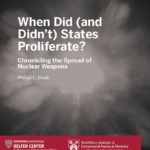 New joint CNS-Belfer Center publication chronicles the history of—and reasons behind—nuclear proliferation worldwide.
New joint CNS-Belfer Center publication chronicles the history of—and reasons behind—nuclear proliferation worldwide. - US Blames Assad Regime for Worst Chemical Weapons Attack in Syria in Years
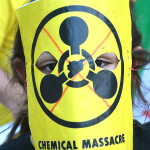 For more on the implications of this latest development, CNS experts are available for comment.
For more on the implications of this latest development, CNS experts are available for comment.
Bibliography (Selected)
- “When Did (and Didn’t) States Proliferate? Chronicling the Spread of Nuclear Weapons” Discussion Paper (Cambridge, MA: Project on Managing the Atom, Belfer Center for Science and International Affairs, Harvard University and Monterey, CA: James Martin Center for Nonproliferation Studies, Middlebury Institute of International Studies, June 2017).
- “Eliminating Syria’s Chemical Weapons and Implications for Addressing Nuclear, Biological, and Chemical Threats Elsewhere” (with Nicholas J. Kramer) Nonproliferation Review Volume 23, Number 1 (2016), pp. 197-230.
- “Elimination of Weapons of Mass Destruction: Lessons from the Last Quarter-Century” (with Chen Kane and Joshua H. Pollack) Nonproliferation Review Volume 23, Number 1 (2016), pp. 15-23.
- “U.S. Security Guarantees and South Korean Proliferation Proclivity: A Crucial Case for Understanding Security Guarantee-Related Coercive Bargaining” (with Eric Lorber in Adam N.Stulberg and Man-Sung Yim (eds.), The Future of Nuclear Energy Cooperation: Lessons, Challenges, and Opportunities Presented by the US-ROK Relationship (book manuscript under review, 2015).
- “Iran Deal Buys Time: Now America’s Real Work Begins” National Interest (July 18, 2015).
- “Kazakhstan’s Nuclear Fuel Bank: A New Nonproliferation Tool” National Interest (June 23, 2015).
- “Extended Deterrence and Allied Nuclear Proliferation” (with Eric Lorber) Journal of Conflict Resolution, Volume 58, Number 3 (April 2014).
- “Atomic Kingdom? Not So Fast…” WMD Junction (November 15, 2013).
- “Turkish-Iranian Relations: From ‘Friends with Benefits’ to ‘It’s Complicated’” (with Aaron Stein) Insight Turkey, Volume 14, Number 4 (2012), pp. 137-150.
- “Shadow Wars: Covert Operations Against Iran’s Nuclear Program” (with David Vielhaber) Nonproliferation Review, Volume 19, Number 3 (November 2012), pp. 481-491.
- “Turkey and America Face Iran” (with Aaron Stein) Survival: Global Politics and Strategy, Volume 54, Issue 2 (April-May 2012), pp. 27-38.
- (German) “Abrüsting und Nichtweiterverbreitung” (mit David Vielhaber) in Simon Koschut und Magnus-Sebastian Kutz (hrsg.), Außenpolitik USA: Theorie – Prozess – Politikfelder – Regionen (Verlag Barbara Budrich, 2012). “Arms Control and Nonproliferation” (with David Vielhaber) in Simon Koschut and Magnus-Sebastian Kutz (eds.), U.S. Foreign Policy: Theory, Process, Subject Areas, Regions (Barbara Budrich Publishers, 2012).
- “Chemical Weapons and Public Health” (with Ernest C. Lee and Stefanos N. Kales) in Barry S. Levy and Victor W. Sidel (eds.) Terrorism and Public Health, 2nd Edition (Oxford University Press, 2011).
- “Revisiting Aum Shinrikyo: New Insights into the Most Extensive Non-State Biological Weapons Program to Date” Nuclear Threat Initiative Issue Brief (December 2011).
- “Why Do States Proliferate? Quantitative Analysis of the Exploration, Pursuit, and Acquisition of Nuclear Weapons” in William C. Potter with Gaukhar Mukhatzhanova (eds.), Forecasting Nuclear Proliferation in the 21st Century: The Role of Theory (Stanford, CA: Stanford University Press, 2010).
- “Minimizing Civil Highly-Enriched Uranium Stocks by 2015: A Forward-Looking Assessment of U.S.-Russian Cooperation” (with Laura Holgate) in Future of the Nuclear Security Environment 2015 (Washington, DC: The National Academies Press, 2009), pp. 89-104. Note: Russian translation published by Russian Academy of Sciences.
- “Deterring, Compelling, and Cooperating with States to Bar Non-State Routes to the Bomb” Center for Strategic and International Studies, Project on Nuclear Issues 2007 Conference Series Papers (April 2008), pp. 3-13.
- “Nuclear Weapons, Strategic Stability, and Conflict between India and Pakistan” Occasional Paper (New Delhi: Delhi Policy Group, Spring 2008).
- “After an Attack: Preparing Citizens for Bioterrorism” with Richard Danzig and Rachel Kleinfeld, (Washington, DC: Center for a New American Security, June 2007), pp. 1-68.
- “Global Cleanout of Civil Nuclear Material: Toward a Comprehensive, Threat-Driven Response” Issue Brief #4, Center for Strategic and International Studies, Strengthening the Global Partnership Project (September 2005) pp. 1-11.
- “Global Cleanout: An Emerging Response to the Civil Nuclear Material Threat” Occasional Paper (Cambridge, MA: Project on Managing the Atom, Belfer Center for Science and International Affairs, Harvard University, September 2004), pp. 1-43.
- “Kazakhstan’s Nuclear Fuel Bank: A New Nonproliferation Tool” National Interest (June 23, 2015).“Extended Deterrence and Allied Nuclear Proliferation” (with Eric Lorber) Journal of Conflict Resolution, Volume 58, Number 3 (April 2014).
- “Project Vinca: Lessons for Securing Civil Nuclear Material Stockpiles” Nonproliferation Review (Fall-Winter 2003), Volume 10, Number 3, pp. 1-23.
